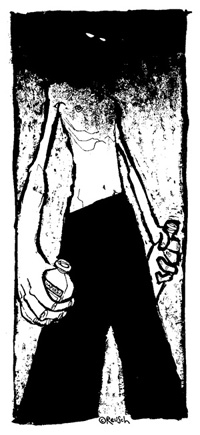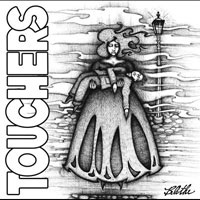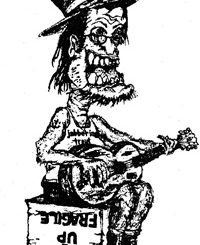B lackout Rationalizations
lackout Rationalizations
by Scott Hefflon
illustration by Mark Reusch
It finally happened. It happens to every hardcore drinker sooner or later, but that doesn’t ease the impact of the fact that it just happened to me. My first blackout. I don’t feel like a proud father, nor like a recently deflowered virgin, I feel like a stupid ass with a drinking problem that just let it escalate to the next level.
Evidently, loss of memory due to blackouts is much like the time lapse when you doze off. You look at the clock, blearily register the time, and a moment later when you check the clock again, you discover hours have gone by. The main difference between these two scenarios is that during an alcohol-induced blackout, your body isn’t resting comfortably in bed, it’s most likely out at a bar somewhere acting on the impulses that are likely to occur in one who has had so much to drink that they’d black out in the first place.
Blacking out during a stint of extreme intoxication, to the point where I was acting out of character, I then had to try to piece together the chain of events, after the fact, based solely on hearsay. What an eye-opener. As a “veteran” alcoholic (does a decade of consistent, excessive drinking qualify one as a veteran alcoholic? I’m confident enough to use the phrase, so perhaps it is so) I’ve become, out of necessity, rather conscious of the mood swings, altered behavior, and occasionally vicious verbal abuse that goes hand in hand with drinking an awful lot. Too much, to some, but “an awful lot” by my scale of such things. Like anyone who’s had a bit much to drink and said things that come back to haunt them; sure, I often don’t remember saying or doing the exact unmentionable of which I’m accused, but I base how much credibility I give the alleged incident on Is it in my character?
After a decade (the same one coincidentally) of not-especially-pleasant introspection, one really ought to have a reasonably good grasp on what they are capable of doing, knowing whether or not it is in your nature to respond in certain ways. Once a person has traveled the horrific road to the depths to which they will voluntarily stoop, as strange as it sounds, that person can have faith that they didn’t do the terrible deed of which they are accused. Not in the way it is originally presented, at least. And usually, if you do have unflagging faith in the understanding of your nature, the one accusing you will admit your actions were based on hearsay or a slightly exaggerated account. Based on your admission that you don’t remember the incident very clearly anyway, many people will find it advantageous to spice up the tale, just to get you to admit it’s possible that you did it. Nope. That doesn’t fly if you’ve got faith in yourself. Example: “I most certainly did not dance naked on the coffee at the party and bonk you on the head with my dick. I may well have been dancing on the coffee table, especially if ‘Lyin’ Ass Bitch’ or another early Fishbone song was playing. I doubt very much that I was doing it naked. My pants may have, in fact, slipped to mid-thigh level, as they are wont to do when I’m overly excited, but I certainly was not naked in public. And as far as bonking you with my dick? Even if all these things did occur, what the hell were you doing standing so close to me that I would even be able to bonk you on the head?” The beauty of it is, with a rational breakdown-and-analysis routine like that, you’ll probably get away with it. Unless the other party is as bull-headed and proud as you are, you should probably stay the hell away from that person anyway. Self-preservation is a strong instinct.
If I may become unnecessarily personal and intimate, I’d like to not analyze generalities in a haughty, self-fortifying manner, and get back to the actual problem. I blacked out. None of this “explore the concept” stuff – something actually happened and must be addressed directly. Yeah, this ought to be fun. OK, so I have issues. That’s the catch phrase for attempting to explain away a long list of hang-ups, and, well, problems. As one of those truly annoying, holistic, self-serving, introspective types, I am aware that each problem is intricately linked to other “kinks,” both advantageous and detrimental, and is probably so ingrained in the functioning system (as it now exists) that by altering/changing one variable, the end result is that many things will be affected. And if a result of the problem, as opposed to the problem itself, is altered, the problem will still exist and eventually rear its head again in a different manifestation. Self-surgery is a mighty risky endeavor. Shall we make the first incision?
We begin by addressing the obvious, and attempting to trace the undesirable actions to their root causes. The first obviousness to attack is the excessive drinking. Duh. While the short-term benefits of controlled, consistent drinking are easily justified, the root problem is not being solved by the drinking, only more time is bought to slowly work out the problem and deal with it in a more relaxed fashion. The temporary solution, however, can obviously become a problem in itself, thus defeating the purpose of alcohol’s calming effects in the first place. And buying time becomes an end in itself. So, in theory, there goes the idea of using booze for therapeutic purposes. To blindly eliminate the now-problematic life-lubricant would be disastrous. Whatever good it was meant to do, prior to its inevitable corruption, must still be accomplished by it or by an alternative method. And preferably not a substitute substance; let’s move a little beyond that, OK? So, let’s dig further… Before it became a nasty habit itself, what was the purpose of repeatedly drinking so much? The obvious answer, other than childish escapism, is as a tried-and-true method of tolerating the intolerable. While bloated slogans such as that work as flippant rationalizations, they don’t cut to the quick. So, let’s dig past the time-honored tradition of making excuses for our behavior. You don’t really deal too well with the pressures of your exaggerated lifestyle. In a nutshell, that’s probably much of it. Let’s just begin there, shall we?
Your life is messy. The booze eventually made it even messier, in its own way, but it helped an admitted control-freak live with the fact that the chaotic clutter wasn’t really his fault. In truth, your life’s always been messy, you just never learned how to clean it, nor live comfortably with it. OK, some of the unnecessary loose ends have tied themselves up over time. Still others linger, and new pressures have arisen to fill the void left by that which has ceased to be problematic. Perhaps there is an equilibrium to the extent you can’t deal with reality. Admittedly, the number of “dangerous” situations and just flat out stupid lifestyle choices have decreased over the years. On the other hand, the cost of each mistake has increased dramatically. That means we’re neither here nor there, just that things are still considered not good, but for different reasons.



